
simulat{ed/ing} 'americans'
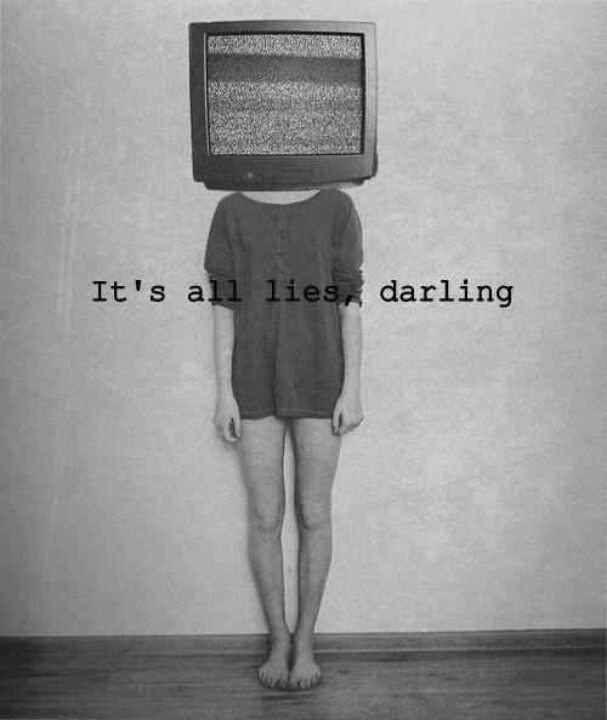
Literary
Permutations of Subjectivity
in
the Televisual Age of Sex and
Race
|
|
|
|
|
|
|
|
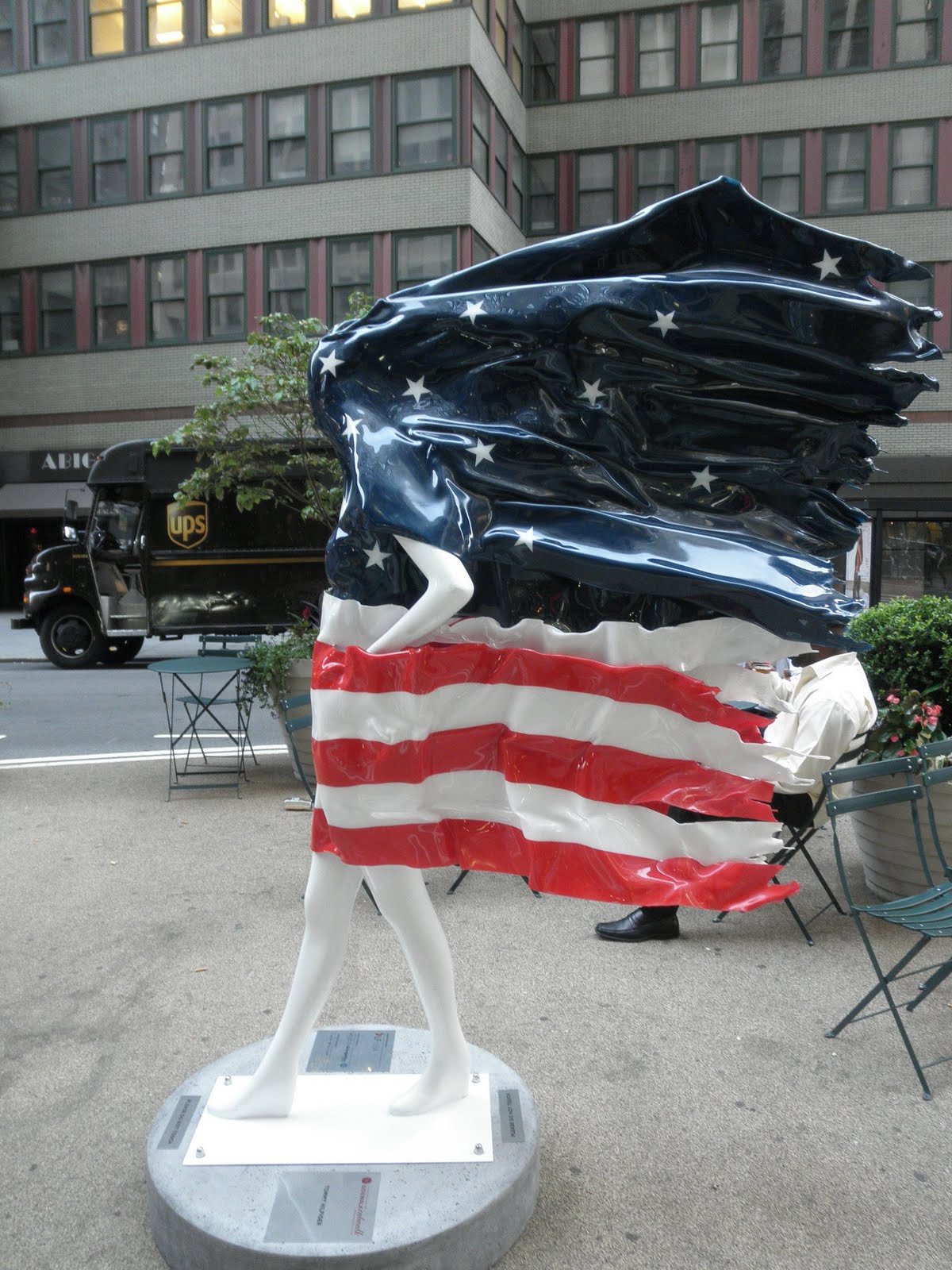 Issues
of simulation (and stimulation, of a sort)
will be our primary terrain in this rambling
tour of American cinema, literature, graphic
narrative, and more. For some reason, and on more than one
occasion, literary titans with an American
background, or an "American" background,
have authored works focused on issues of
simulation and dissimulation, miming, aping,
copying, mirroring, etc. These narratives of
mimesis are also at once mimetic narratives,
echoing/shadowing/mirroring prior
narratives. Issues
of simulation (and stimulation, of a sort)
will be our primary terrain in this rambling
tour of American cinema, literature, graphic
narrative, and more. For some reason, and on more than one
occasion, literary titans with an American
background, or an "American" background,
have authored works focused on issues of
simulation and dissimulation, miming, aping,
copying, mirroring, etc. These narratives of
mimesis are also at once mimetic narratives,
echoing/shadowing/mirroring prior
narratives.  For
instance, you don't have to be Jorge Luis
Borges (see "The Circular Ruins" and "Tlön,
Uqbar, Orbis Tertius") to understand that
literary history is a grand symphony of
mimicry and mocking--that Melville's Moby Dick,
is, in some ways, a rewriting of the Old
Testament (the Old Testament, itself, being
but a treasure trove of revised Assyrian
mythologies--and god knows who they
lifted their tales from). For
instance, you don't have to be Jorge Luis
Borges (see "The Circular Ruins" and "Tlön,
Uqbar, Orbis Tertius") to understand that
literary history is a grand symphony of
mimicry and mocking--that Melville's Moby Dick,
is, in some ways, a rewriting of the Old
Testament (the Old Testament, itself, being
but a treasure trove of revised Assyrian
mythologies--and god knows who they
lifted their tales from).
In
this review of largely 20th century American
literary classics and curiosities, we will
focus on all sorts of mimetic acts, from the
exposes/enactments/embodiments of Hollywood
that drive Nathanael West's imagination in
DAY OF THE LOCUST,  and Billy Wilder's fancy
in SUNSET BOULEVARD to the recreations of
Latin America and the U.S/Mexico border that
fuel Gilbert Hernandez's HUMAN DIASTROPHISM,
and Alex Rivera's SLEEP DEALER, to the
meditations on human surrogacy afoot in
Craig Gillespie & Nancy Oliver's LARS
AND THE REAL GIRL and Ira Levin's STEPFORD
WIVES. Always already, we will lurk
in/at/on/with the
uncanny valley. and Billy Wilder's fancy
in SUNSET BOULEVARD to the recreations of
Latin America and the U.S/Mexico border that
fuel Gilbert Hernandez's HUMAN DIASTROPHISM,
and Alex Rivera's SLEEP DEALER, to the
meditations on human surrogacy afoot in
Craig Gillespie & Nancy Oliver's LARS
AND THE REAL GIRL and Ira Levin's STEPFORD
WIVES. Always already, we will lurk
in/at/on/with the
uncanny valley.
 Is our seminar a
literature class focused on mass culture? Or
is it a mass cultural studies class dabbling
in literature. That, in the end, will
be up to you and your own parallel
researches as your contributions to the
seminar are essential to our success. Is our seminar a
literature class focused on mass culture? Or
is it a mass cultural studies class dabbling
in literature. That, in the end, will
be up to you and your own parallel
researches as your contributions to the
seminar are essential to our success.
So our class is a hybrid, a chimera, a
mutt. And it is a mutt in more ways
than one as we are an institutional body
subject to the forces of the mestizaje
(and not just because your professor is Chicano). We are also an
intellectual creature with mixed DNA because some of our students come
from the Department of English and Comparative Literature at SDSU,
while the rest come from MALAS, the Master of Arts in Liberal Arts and
Sciences--LITheads and MALASheads, conspiring intellectually under the
same covers. (The snapchats should be awesome!). And we also have other
brilliant lurkers in our group--Journalism/Media Studies, Sociology,
and even some lurking magnificent undergraduates who have a thirst for
graduate school!
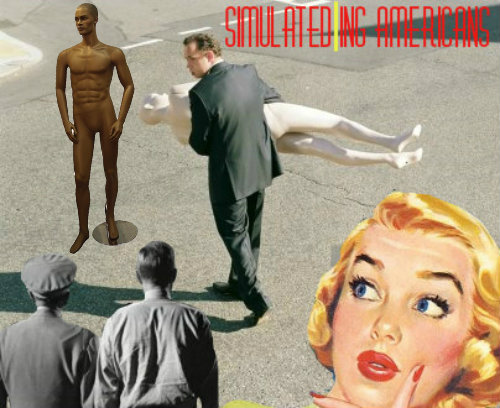 Our friends from literature.sdsu.edu
bring their expertise with books, with
storytelling, with literary criticism to the
party, while our malas.sdsu.edu
denizens bring their interdisciplinary
superpowers to the table--that along with
their willingness to boldly conjoin several
disciplines simultaneously in a single
bound! Each enclave will bring talents,
experiences, and expertise to the mix in a
way that will benefit all of us gathered
here. Our friends from literature.sdsu.edu
bring their expertise with books, with
storytelling, with literary criticism to the
party, while our malas.sdsu.edu
denizens bring their interdisciplinary
superpowers to the table--that along with
their willingness to boldly conjoin several
disciplines simultaneously in a single
bound! Each enclave will bring talents,
experiences, and expertise to the mix in a
way that will benefit all of us gathered
here.
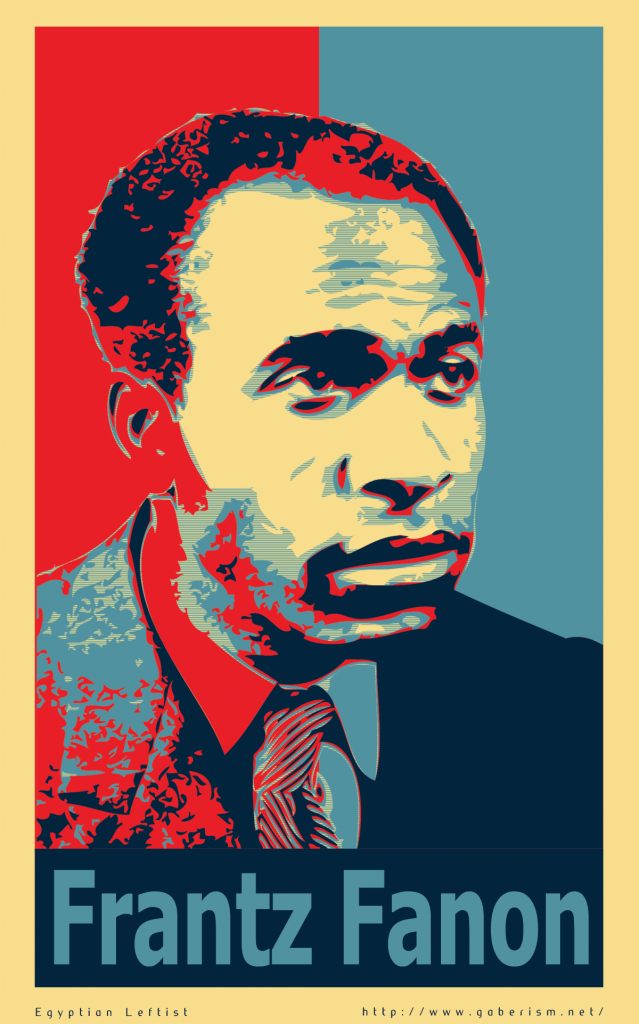 Studying
American Literature using tactics gleaned
from critical theory and interdisciplinary
studies is
nothing to sneeze at. On the surface it is
what it proclaims itself to be--an
intellectual project that shuns any strict
allegiance to any one field, any one set of
practices and conventions. The popularity of
interdisciplinary studies across the academy
has been fueled by the avalanche of
innovation led by post-structuralists
including: Jacques Derrida (Philosophy),
Michel Foucault (Intellectual History),
Edward Said (Literature and {later} Post
Colonial Studies), Jacques Lacan (with
Frantz Fanon, and later, Luce Irigaray)
(Psychoanalysis), Andy Warhol, Michael
Basquiat (Art), Marshall McLuhan (and later,
Stuart Hall) (Media Studies/Cultural
Studies), and Gayatri Spivak
(Marxist Criticism) {just to name a few}. Interdisciplinary and cultural studies are
practices that reward the eclectic,
wandering mind. In interdisciplinary
studies, the periphery is rich, and the
margins reveal themselves as the best places
to investigate cultural phenomena. Studying
American Literature using tactics gleaned
from critical theory and interdisciplinary
studies is
nothing to sneeze at. On the surface it is
what it proclaims itself to be--an
intellectual project that shuns any strict
allegiance to any one field, any one set of
practices and conventions. The popularity of
interdisciplinary studies across the academy
has been fueled by the avalanche of
innovation led by post-structuralists
including: Jacques Derrida (Philosophy),
Michel Foucault (Intellectual History),
Edward Said (Literature and {later} Post
Colonial Studies), Jacques Lacan (with
Frantz Fanon, and later, Luce Irigaray)
(Psychoanalysis), Andy Warhol, Michael
Basquiat (Art), Marshall McLuhan (and later,
Stuart Hall) (Media Studies/Cultural
Studies), and Gayatri Spivak
(Marxist Criticism) {just to name a few}. Interdisciplinary and cultural studies are
practices that reward the eclectic,
wandering mind. In interdisciplinary
studies, the periphery is rich, and the
margins reveal themselves as the best places
to investigate cultural phenomena.
Because of the particular training of your
ringleader, our readings during the course
of the semester will foreground issues of
great debates presently roiling the corridors of academe, so that race, gender, sexuality,
and politics will drive many
of our discussions--that said, the floor
will be open to other approaches/other
“texts,” and graduate students in our
seminar should feel empowered to share
books, films, essays, and the like that
embody the best of cultural and
interdisciplinary studies.
 Agents of
intellectual evolution and change, graduate
students who engage in espionage
focused on simulated and simulating
Americans, we will be treated to an
ever-evolving tapestry of practices and
phenomena, peering over the shoulder of one
practitioner here, gleaning new insights
from another researcher in another field
(and another focus) there, English &
Comparative Literature and MALAS graduate
students (and their
peers/comrades/partners-in-crime) from other
fields will find themselves re-inventing
themselves and their intellectual scope each
week, and in the end, are all the stronger. Agents of
intellectual evolution and change, graduate
students who engage in espionage
focused on simulated and simulating
Americans, we will be treated to an
ever-evolving tapestry of practices and
phenomena, peering over the shoulder of one
practitioner here, gleaning new insights
from another researcher in another field
(and another focus) there, English &
Comparative Literature and MALAS graduate
students (and their
peers/comrades/partners-in-crime) from other
fields will find themselves re-inventing
themselves and their intellectual scope each
week, and in the end, are all the stronger.
 This
graduate seminar is listed both as an
English American Literature seminar (Engl
625) and a MALAS cultural studies seminar
(MALAS 600B), and is open to graduate
students in all fields and
disciplines--graduate students in Theatre,
Film, Art, Women's Studies, Chicana/o
Studies, and Anthropology are invited to
consider adding this class to their Spring
2015 roster of courses; advanced
undergraduates should write memo@sdsu.edu if
they are interested in auditing a seminar or
two. This
graduate seminar is listed both as an
English American Literature seminar (Engl
625) and a MALAS cultural studies seminar
(MALAS 600B), and is open to graduate
students in all fields and
disciplines--graduate students in Theatre,
Film, Art, Women's Studies, Chicana/o
Studies, and Anthropology are invited to
consider adding this class to their Spring
2015 roster of courses; advanced
undergraduates should write memo@sdsu.edu if
they are interested in auditing a seminar or
two.

|
|
Seminar
Logistics
How to succeed in
our introduction to cultural
studies/interdisciplinary
studies seminar...
 n English &
Comparative Literature or MALAS graduate
seminar--the closest you can get to doing
doctoral level work in the humanities at
SDSU--is a pretty serious thing. n English &
Comparative Literature or MALAS graduate
seminar--the closest you can get to doing
doctoral level work in the humanities at
SDSU--is a pretty serious thing.
Or, better put: it can be
a pretty serious thing.
But not serious in the "heart-attack" sense of "serious"; more like
serious
in the "great, now i have to be
accountable for my intellectual range,
preparation, and imagination" sense.
Our expectation,
of course, is that you will enter each
seminar session having carefully completed
the assigned reading for a given day--if
you do not intend to keep up with the
readings, why be part of the
adventure?
But you should also know that our desires
far outstrip our expectations!
Our desire is that you will have both
prepared the material by doing the
reading, but that you will also have
“prepared” the material as if you were the
professor for the class--this is, in fact,
what sets your work as a graduate student
apart from your previous work in
undergraduate classes. That means
doing the reading, surveying recent
research in the field of said work,
looking up published reviews and
scholarship that focus on said work, and
preparing questions (both discussion
questions and close-reading-related
questions) to share with your professor
and your colleagues. When we are
undergraduates, it is easy, perhaps, to
sit in the back of the room and listen.
And while you can still get away with this
as a graduate student, you must also
consider that said silence does your
colleagues a disservice. Promise me (and
promise yourself) that you will use the
time we have together to share the amazing
contours of your imagination!
Graduate
Seminar Presentations (or "you
are the professor")
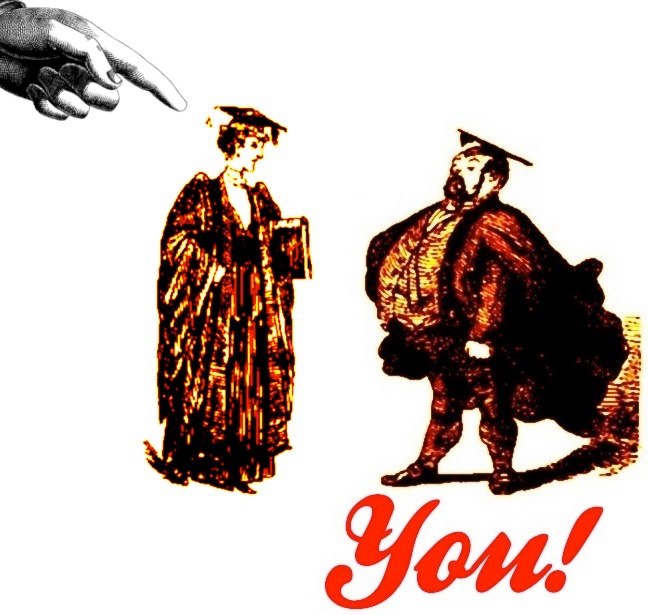 Graduate
Student presentations are not mandatory for this class--however, if you
spy an upcoming work on the reading list and you want to deliver a 20
minute presentation that will benefit your development as a scholar,
write me at memo@sdsu.edu and give me a headsup about your wishes! Yes,
this will bless you with "extra-credit" which MAY be of use when it
comes time to determine your grade. Graduate
Student presentations are not mandatory for this class--however, if you
spy an upcoming work on the reading list and you want to deliver a 20
minute presentation that will benefit your development as a scholar,
write me at memo@sdsu.edu and give me a headsup about your wishes! Yes,
this will bless you with "extra-credit" which MAY be of use when it
comes time to determine your grade.
Seminar
Paper
 This being a
"graduate seminar," it is expected that
you will produce an amazing piece of
rhetorical excellence in the course of the
semester--a seminar paper or essay. To
that end, you will submit to me on
Tuesday, May 12, 2015, in our seminar at the Blind Lady Alehouse (see below), a
well-researched, nicely crafted,
exquisitely-honed critical essay anywhere
from 15 to 20 pages; note that this is the
final day of class and we will be having
an in-class colloquium/party where you
will share your findings in
well-honed/crafted 5 minute oral
presentations (think of it as doing
standup, with smarts!) The essay
should be typed, double-spaced, and
carefully proofread. It should not have
any special cover page or plastic cover--a
staple or paper clip in the upper left
hand corner is fine. This being a
"graduate seminar," it is expected that
you will produce an amazing piece of
rhetorical excellence in the course of the
semester--a seminar paper or essay. To
that end, you will submit to me on
Tuesday, May 12, 2015, in our seminar at the Blind Lady Alehouse (see below), a
well-researched, nicely crafted,
exquisitely-honed critical essay anywhere
from 15 to 20 pages; note that this is the
final day of class and we will be having
an in-class colloquium/party where you
will share your findings in
well-honed/crafted 5 minute oral
presentations (think of it as doing
standup, with smarts!) The essay
should be typed, double-spaced, and
carefully proofread. It should not have
any special cover page or plastic cover--a
staple or paper clip in the upper left
hand corner is fine.
What will
this beautiful essay be about? That's the
fun part! Let us first
consider the obvious: you are a graduate student. What does
that mean? It means that you are a
scholarly apprentice of sorts. You are one
in a long line of individuals who aspire
to scholarship--someone who aims to
produce an exegesis of the first order.
Like it or not, one of the things
that will determine whether or not you
have what it takes to get past the gates
at the ivory tower is your writing.
It used to be that writing for literary
journals was an extended exercise in pain
and self-abuse. But the field is changing
and so are its journals. That is the
easy part.
How will you go about imagining this
essay? Please have your essay derive or be
based in large part on a text, author,
director, theme, genre which is part of
the required material for our class;
moreover, I am also open to you conceiving
of your submission to me as a draft
chapter from your master's thesis, or a
possible submission to critical journal.
Footnote
vs. endnote? MLA style vs. Chicago style
vs. APA style?
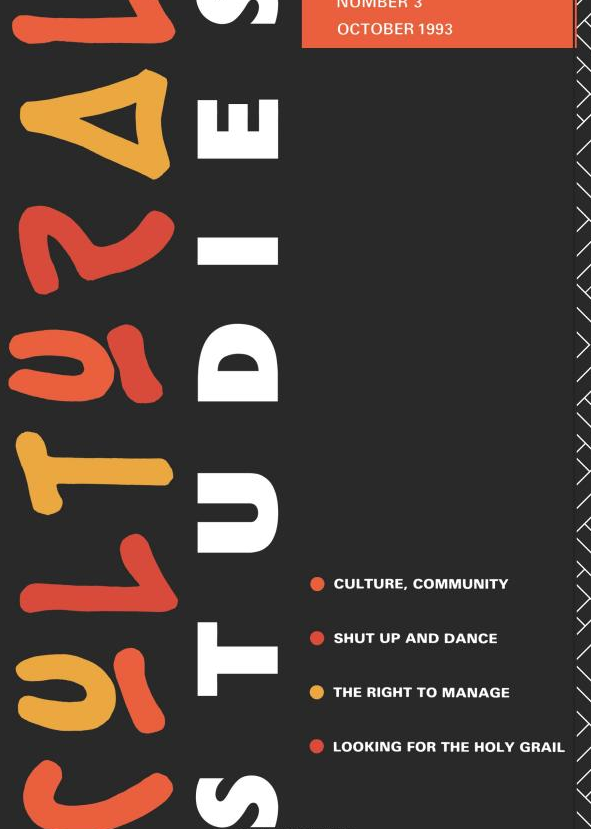 These
controversies
have been solved for you in advance. As
part of your assignment, I want you to
immerse yourself in the variety of
journals now publishing essays in ,
literature, film studies, cultural
studies, comparative literature and
contemporary studies in comparative
cultures. You may complete this immersion
here at SDSU's Love library, at USD, or
UCSD. These
controversies
have been solved for you in advance. As
part of your assignment, I want you to
immerse yourself in the variety of
journals now publishing essays in ,
literature, film studies, cultural
studies, comparative literature and
contemporary studies in comparative
cultures. You may complete this immersion
here at SDSU's Love library, at USD, or
UCSD.
Some pretty good journals include: american
literature, boundary 2, critical
inquiry, social text, pmla, south
atlantic quarterly, camera obscura
and cinema
journal.
Think of your essay, then, as an exercise
in role-playing--any question you might
have about format, tone, styles,
footnoting tactics and the like will be
answered by the editorial policy of the
journal you select as your guide. Do
please submit with your seminar essay,
a copy of one essay
from the journal you have selected that represents to you the BEST that
journal has to offer. Also, if you can find it, include a xerox of the
page in the journal where they tell prosepective contributors how to
format their submissions.
Do note that our library has great,
full-text, online journal archives like project muse
and jstor--if
you are off campus, you may have to log-in
through the SDSU
Libweb server reference index to
access these invaluable index. If you have
any question as to the appropriateness of
a journal just give me a call or pull me
aside and ask me.
What
can
you write on? Well, just about anything. I
imagine the best exercise will be to throw
all your books and notes on a table, think
about what are some of the provocative
issues that have stayed with you during
the term and then head off to the library
and those endless stacks of scholarly
journals. By the time you’ve paged through
all those journals and get back to your
books and notes, you’ll have a firmer
grasp on the goals of your analytical
adventure. You’ll also probably have a
headache--welcome to academe.
Seminar Paper Prompts
 I don't usually give out essay prompts to graduate students--the reason for that is simple: graduate students should be pursuing
their own line of research, building on the required readings for the
class, but also, then, voraciously researching hunches/ideas that
appeal to THEIR intellectual sensibility. However, I realize that not
all graduate students in an MA program are ready for that level of engagement,
so I will provide here, for your entertainment and delight, a short
list of seminar paper prompts: I don't usually give out essay prompts to graduate students--the reason for that is simple: graduate students should be pursuing
their own line of research, building on the required readings for the
class, but also, then, voraciously researching hunches/ideas that
appeal to THEIR intellectual sensibility. However, I realize that not
all graduate students in an MA program are ready for that level of engagement,
so I will provide here, for your entertainment and delight, a short
list of seminar paper prompts:
1. Technologies of Identity
Research and author an essay focused on the connections between
technology and identity in two of the works we have read this
term--feel free to add in a third text/film from outside the seminar if
you feel it strengthens your thesis.
2. The Pathos of Self-Creation and Self-Loathing
Contrast the writing of Gertrude Atherton and Billy Wilder in Black Oxen and Sunset Boulevard.
While the two works may be read to have a lot in common, there is also
space to see these classic works of fiction and cinema as decidedly
oppositional projects.
3. The Simulated Self/Psyche
Explore the consequences of self-invention in the works of Nathanael West, Oliver Mayer, and Toni Morrison.
4. The Violent Mirror
One of the consequences of simulation is that human psychology gets
warped in the process--explore this premise in three works we have
surveyed this term.
5. American Literature/Film and Race: Ethnic Studies and the Pathology of Verisimilitude.
Using the work of Boucicault, Nericcio, and Morrison, author a
meditation on the vicissitudes of race and ethnicity in their works.
6. Monstrous Beauty
Contrast aesthetics, the branch of philosophy concerned with beauty, with the grotesque,
which may be thought of a science of the ugly or as a philosophy of the
weird/strange, in the works of Palahniuk, West, and Hernandez.
7. The Best Prompt of All
Design your own thesis! Bring a typed, one-paragraph proposal for your
thesis with a tantalizing working title to class on Tuesday, April 21,
2015.
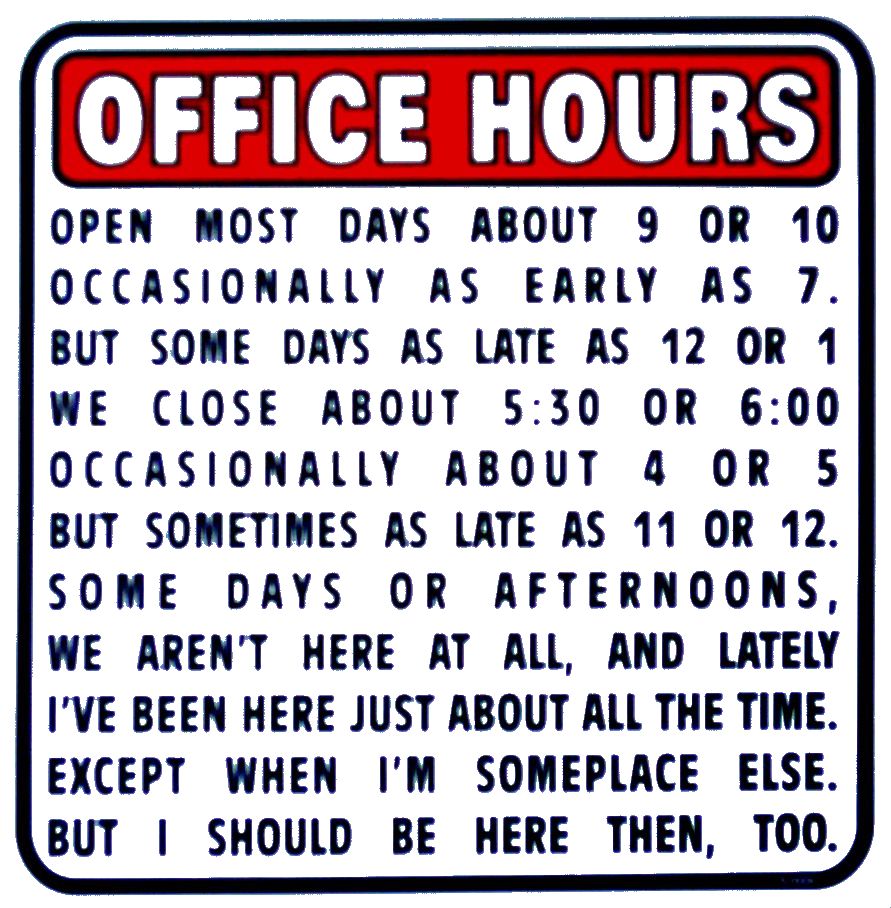 office
hours office
hours
First
thing to do? Ignore this sign on your
left!
My office hours
are on Tuesday afternoons from 1pm to 3:15pm, before our
seminar, and by appointment, in Arts
and Letters 273 (though you may find me in AL 283 from time to time)--do please make the time during the course of the
semester to come on out and
introduce yourself and be a real,
living, breathing, person-- the
social dimension of intellectual life
is key to your development as a
graduate student and, believe it or
not, it will make it easier for you to
emerge as a dynamic agent of our
seminar. My phone number here at SDSU
is 619.594.1524, but the best
way to make sure you get ahold of me
is to send me an email: memo@sdsu.edu.
My
office is pretty easy to find, it's at
the end of the hall to your left after
you enter the Arts and Letters
building 2nd floor, ground-level
entrance. Click the image opposite to
see what awaits you! the
social dimension of intellectual life
is key to your development as a
graduate student and, believe it or
not, it will make it easier for you to
emerge as a dynamic agent of our
seminar. My phone number here at SDSU
is 619.594.1524, but the best
way to make sure you get ahold of me
is to send me an email: memo@sdsu.edu.
My
office is pretty easy to find, it's at
the end of the hall to your left after
you enter the Arts and Letters
building 2nd floor, ground-level
entrance. Click the image opposite to
see what awaits you!
|
|
| REQUIRED TEXTS |
|
FILM:
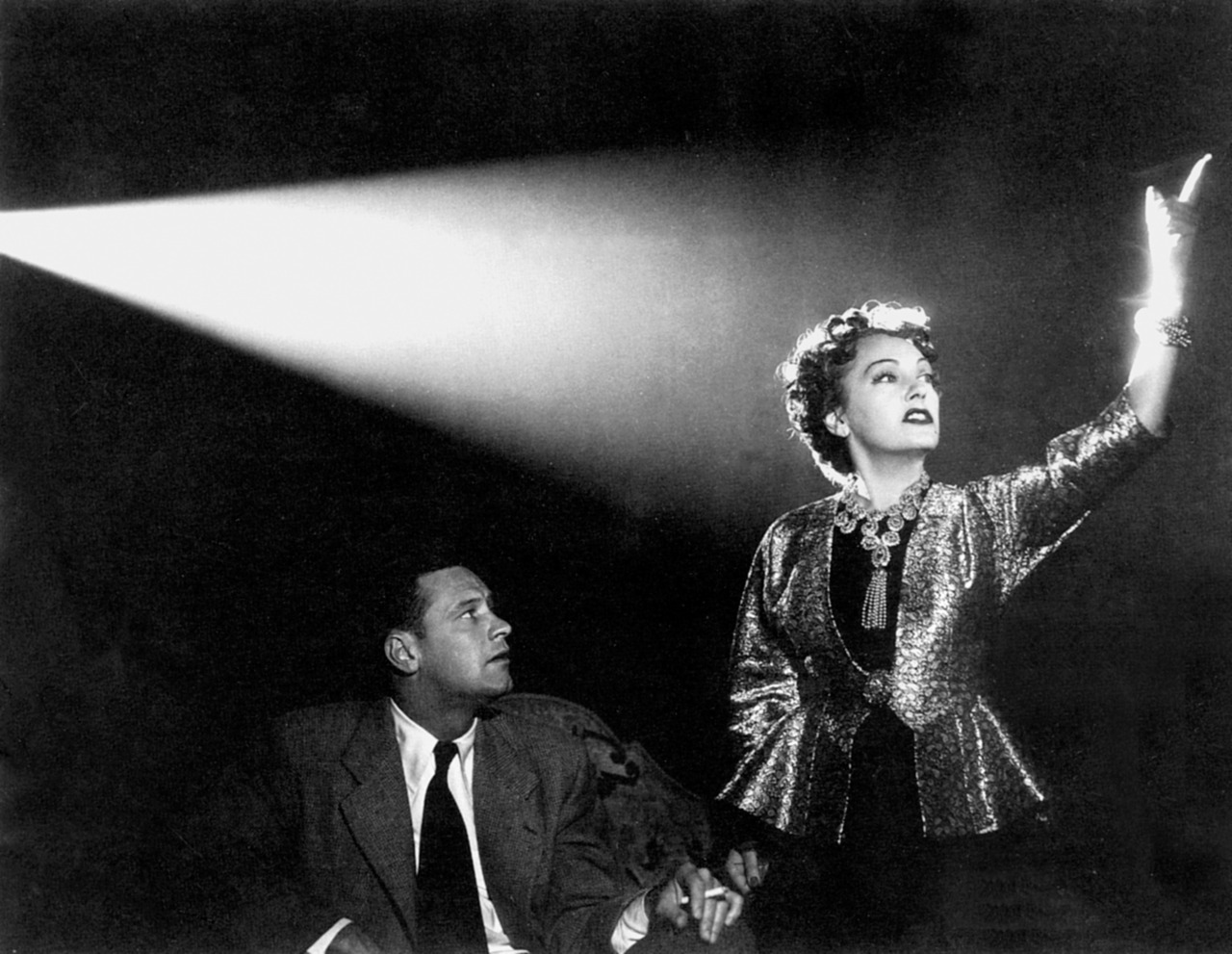
SUNSET BOULEVARD
billy wilder
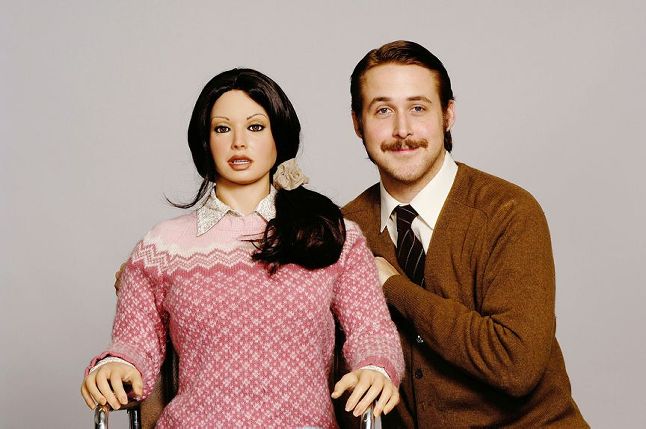
LARS AND THE REAL GIRL
craig gillespie
and nancy oliver
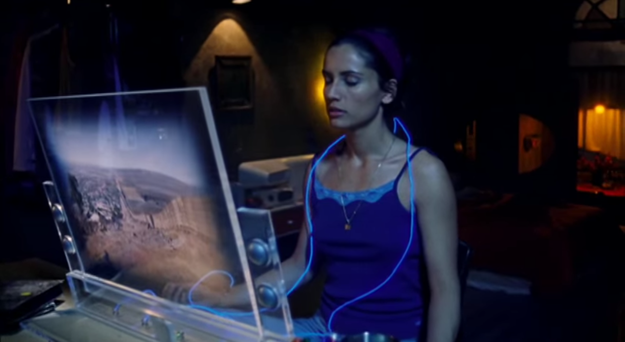
SLEEP DEALER
alex rivera

TOUCH OF EVIL
orson welles
LITERATURE:
OCTOROON
dion boucicault
BLACK OXEN
gertrude atherton
THE STEPFORD WIVES
ira levin
DAY OF THE LOCUST/MISS
LONELYHEARTS
nathanael west
THE HURT BUSINESS
oliver mayer
HUMAN DIASTROPHISM
gilbert hernandez
THE BLUEST EYE
toni morrison
TEX{T}-MEX
william nericcio
INVISIBLE MONSTERS
chuck palhniuk
|
|
| DAY TO DAY MENU |
|
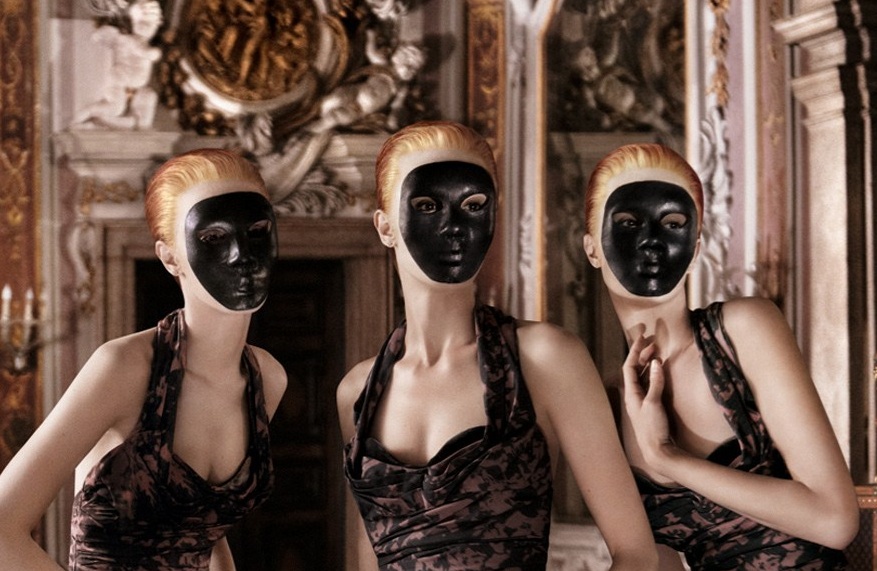
|
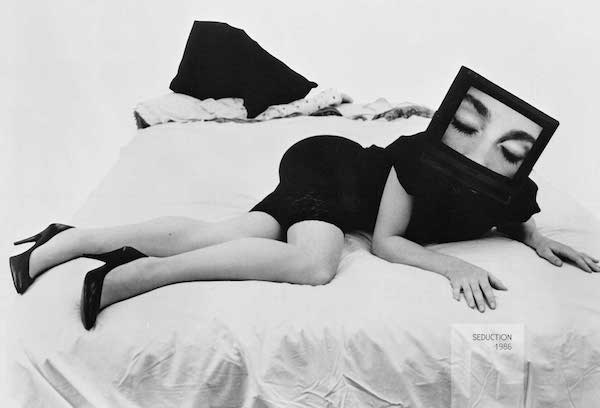
|
|
FIRST CLASS | Tuesday, January 27, 2015
If you are on this web page, then you are enrolled in Simulated
Americans, an American Literature/Cultural Studies seminar that shows
up as either ENGL 625 or MALAS 600B on your registration, depending on
what 'flavor' you chose. Whatever your registration designation,
no worries, it's all the same class for everyone.
So welcome--it has been awhile since I taught a graduate seminar, Fall
2012, to be exact and I am excited to be back in the saddle.
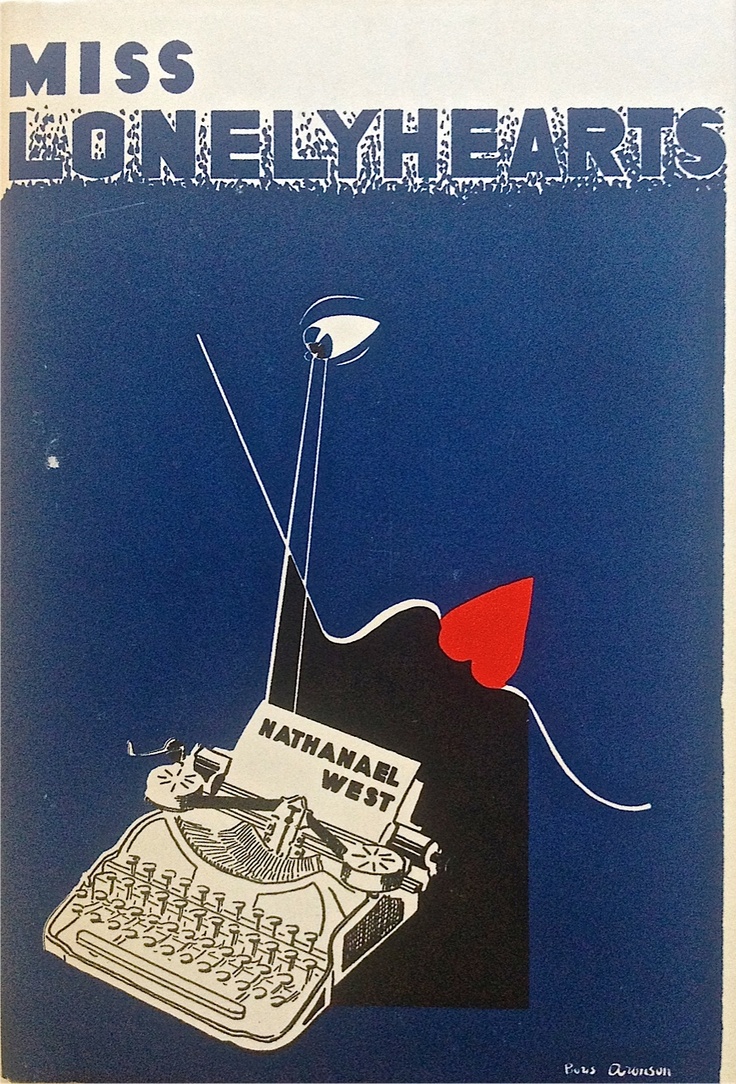 Our
class is going to feature tons of great novels and cinema, but it being
a graduate seminar, you might also want to get doused with some
critical theory! If that is the case, you might want to read a
little bit from Jorge Luis Borges, maybe "Narrative Art and Magic."
and, of course, you must sample Jean Baudrillard;
Critical Theory is important, but not always essential for our work
this semester--I will look to you to bring theoretical works that move
you to seminar for sharing; I can hit you with more, too, (Archive Fever, anyone?) if you demand it. Our
class is going to feature tons of great novels and cinema, but it being
a graduate seminar, you might also want to get doused with some
critical theory! If that is the case, you might want to read a
little bit from Jorge Luis Borges, maybe "Narrative Art and Magic."
and, of course, you must sample Jean Baudrillard;
Critical Theory is important, but not always essential for our work
this semester--I will look to you to bring theoretical works that move
you to seminar for sharing; I can hit you with more, too, (Archive Fever, anyone?) if you demand it.
Today you will walk into the seminar room having read Miss Lonelyhearts by
Nathanael West, aka Nathan Weinstein. As you read, think about
West's take on "simulation," on parroting, aping--the
mirrored/mirroring activities that we imagine to be unique and
personal--Shrike is a monster, in every sense of the word! The more you
read his little novella, the more you'll understand the depths of
West's imagination when it comes to simulated "Americans."
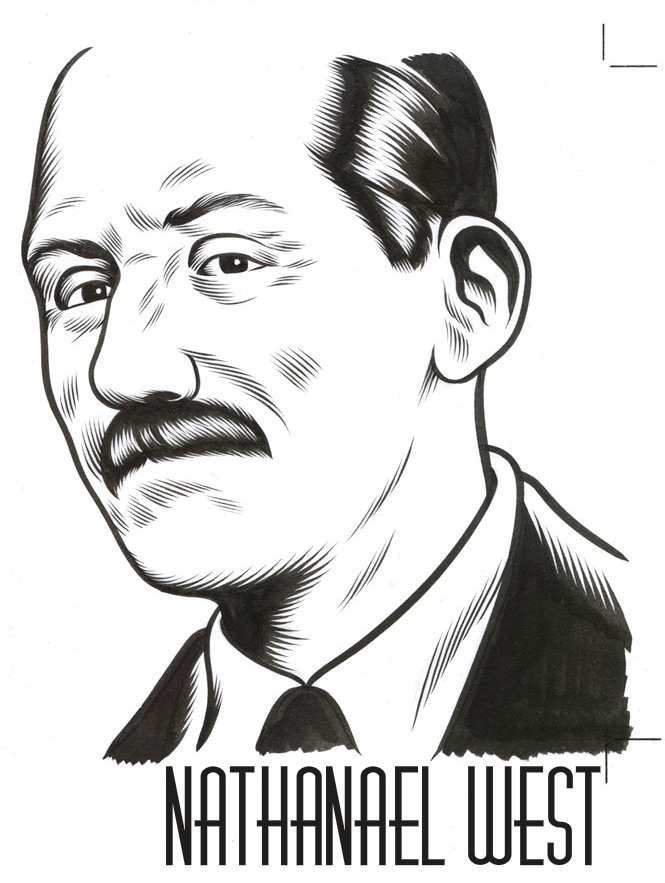
|
|
| |
|
SEMINAR 3 | Tuesday, February 10, 2015
Seminar 3 has been cancelled; apologies to all students! Use the time to catch up on your readings of West and Atherton.

|
|
SEMINAR 4 | Tuesday, February 17, 2015
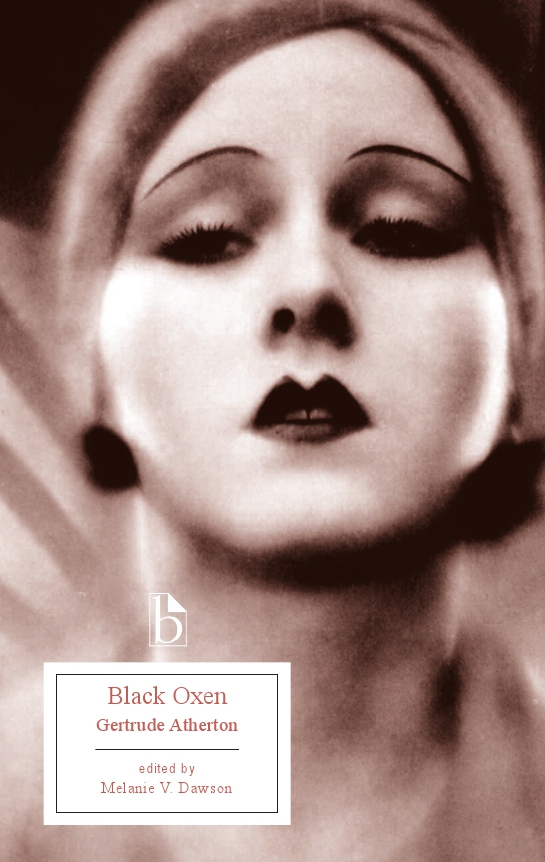
Seminar 4 finds us going back in time to the wild
20s--with Atherton's
novel, BLACK OXEN, we are taken to a world that precedes West's novels,
but that reveals as well the foundation for some of his more disturbing
revelations. The novel also prepares us, looking forward, for
Billy Wilder's SUNSET BOULEVARD, another text featuring a female
protagonist disturbed by passing time, obsessed with the damning
consequences of aging. Please bring to class a one-page (250
word) piece of writing that engages with a direct quote pulled from the
reading. What to choose? Focus on the one passage that you would
isolate as the most pivotal
(or provocative, or mesmerizing, or confusing--your call) and then
explore why it functions in this way for your reading of Atherton's
opus!
|
|
SEMINAR 5 | Tuesday, February 24, 2015
As a supplement to Atherton, we plunge into the abyss of tragedy,
comedy, reverie, nostalgia and just plain genius that is Sunset
Boulevard by Billy Wilder--if you wish to get ahead, as you have no
reading this week, throw yourself into Dion Boucicault's THE OCTOROON
in preparation for Seminar 6.
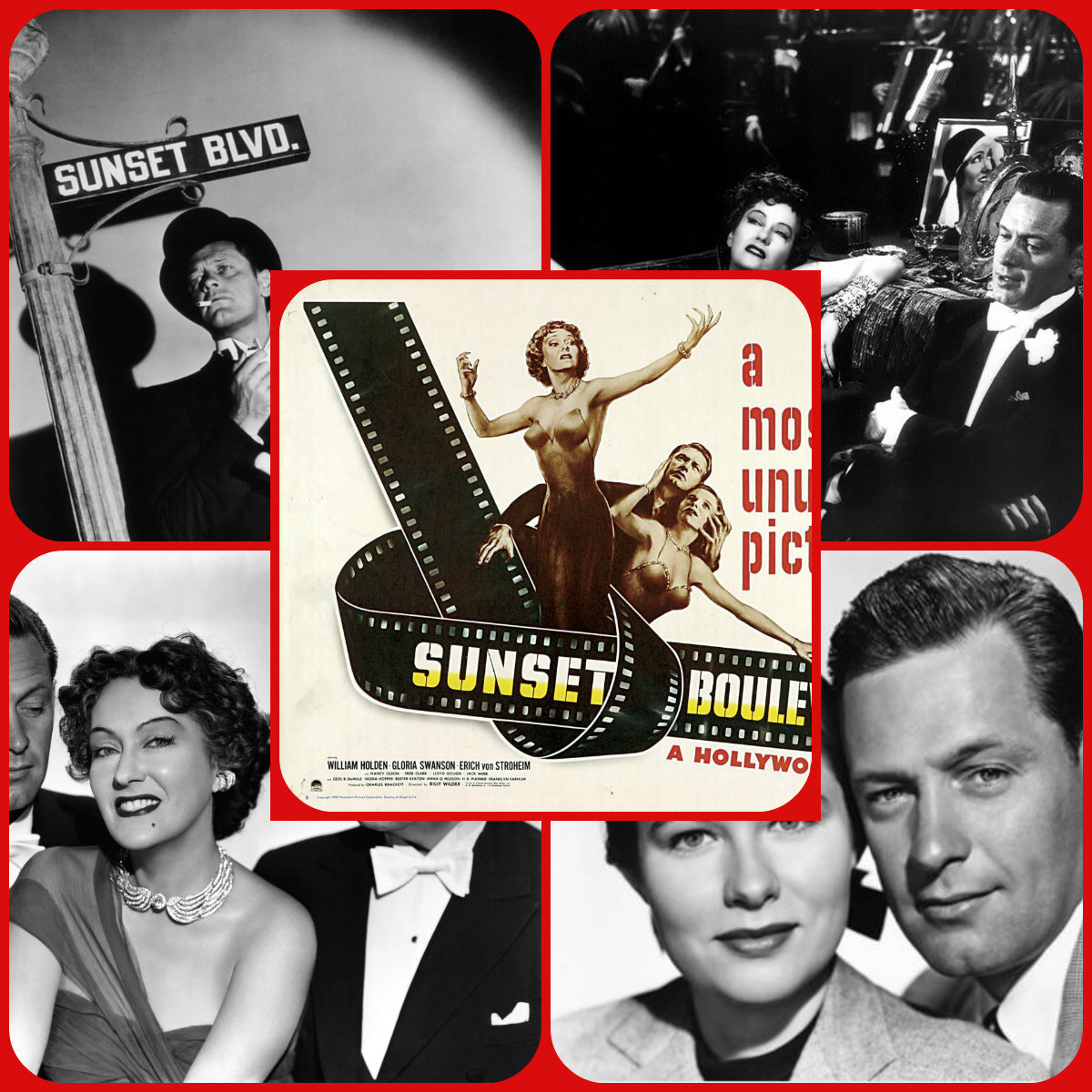
|
|
SEMINAR 6 | Tuesday, March 3, 2015
|
Read the introduction, two 'hallucination galleries' and any chapter you please other than that from Tex[t]-Mex: Seductive Hallucinations of the 'Mexican' in America. In
class, we will screen SLEEP DEALER by Alex Rivera--a meditation on
borders, real and virtual in and between the United States and
Mexico. You are also expected to attend this event on Thursday
where you can meet and hang with the Director, Alex Rivera!
click to enlarge:
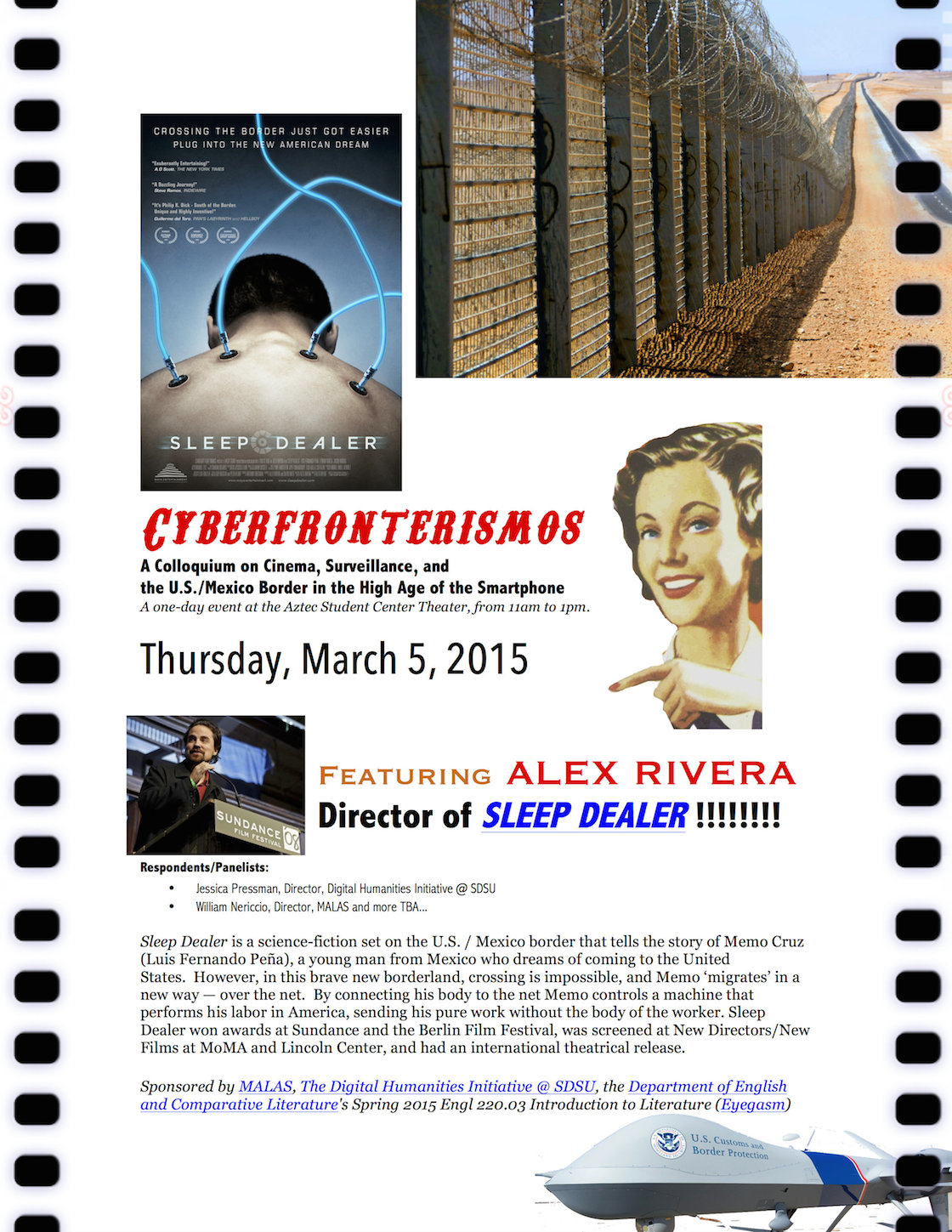
|
|
SEMINAR 7 | Tuesday, March 10, 2015
What is a play by a Irishman who made his fame (and infamy) on the
London stage, doing in an American Literature Graduate seminar? Has
all hell broken loose? Am I playing havoc with the canon? No,
it's just that THE OCTOROON was the CATS of its day, the LION KING of
its epoch! --a smash hit on the American stage. Extra-credit to
any individual or group of individuals who do a scene from the play for
the class!!!!! We are doing the play this week in my undergraduate Eyegasm seminar--the assignment there is specifically for that class, but you may find it to be useful also!
|
|
SEMINAR 8 | Tuesday, March 17, 2015
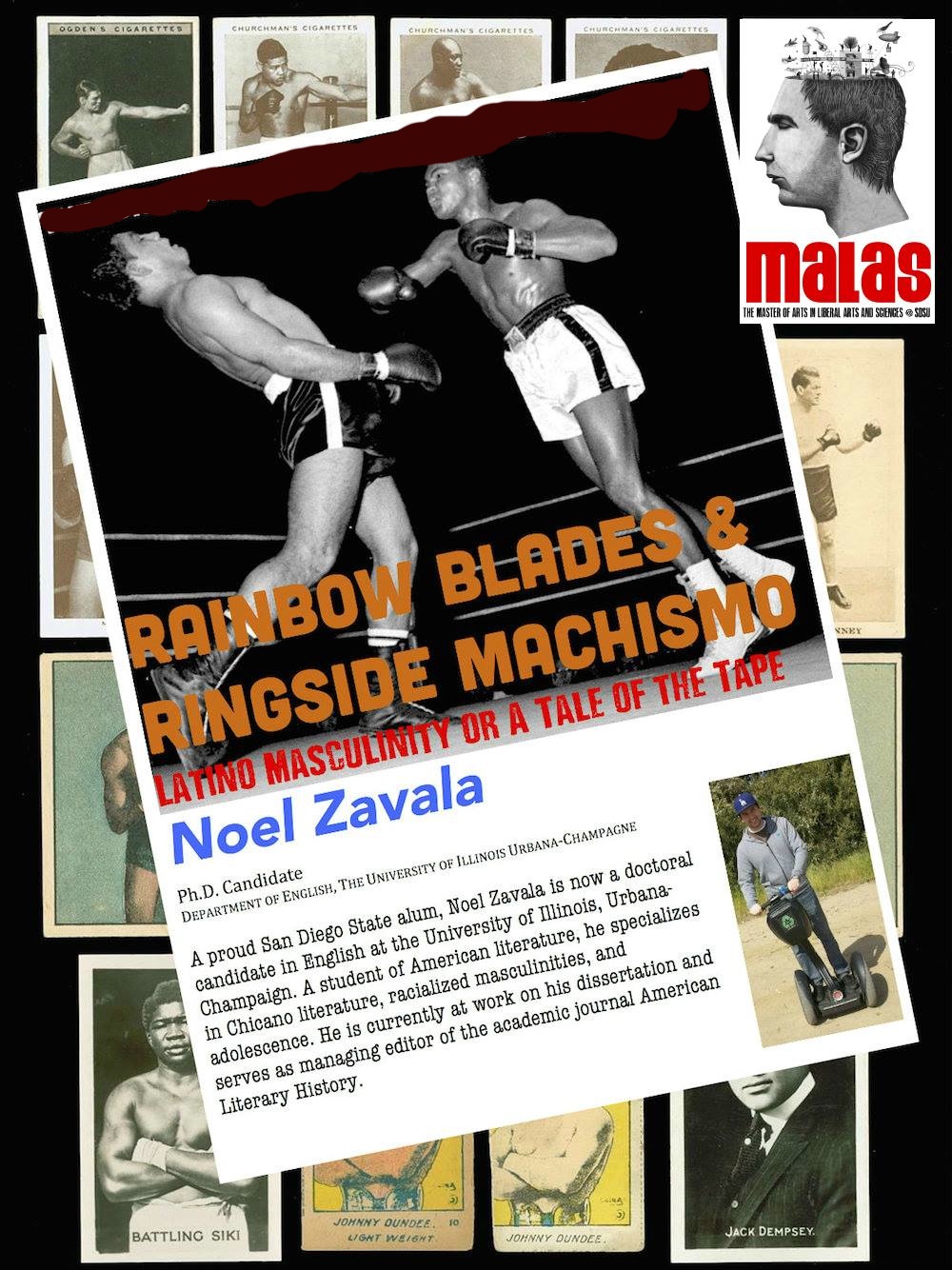
Race, gender, and ethnicity are all at the forefront of OLIVER MAYER's
writings. For seminar today, prepare two of his plays, BLADE TO
THE HEAT and YOUNG VALIANT (and as much of the support material in THE
HURT BUSINESS as you can stomach/devour).  Our class will feature a discussion of both works AND a guest lecture
by University of Illinois Urbana-Champagne PhD candidate (and SDSU
English Alum) Noel Zavala (more
here). Zavala's lecture, "Rainbow Blades and Ringside Machismo: Latino
Masculinity (a Tale of the Tape)," will open the class, followed by a
Q&A, and then, after break, a general discussion of Mayer's
literary combo.
Our class will feature a discussion of both works AND a guest lecture
by University of Illinois Urbana-Champagne PhD candidate (and SDSU
English Alum) Noel Zavala (more
here). Zavala's lecture, "Rainbow Blades and Ringside Machismo: Latino
Masculinity (a Tale of the Tape)," will open the class, followed by a
Q&A, and then, after break, a general discussion of Mayer's
literary combo.

click to enlarge
|
|
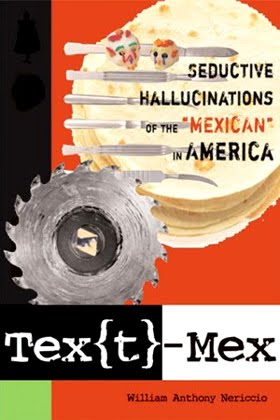 SEMINAR 9 | Tuesday, March 24, 2015 SEMINAR 9 | Tuesday, March 24, 2015
Read
the Rita Hayworth and Touch of Evil Chapters in TEXTMEX--in class
we will screen Orson Welles's magnificent mediation on the U.S. Mexican
border, TOUCH OF EVIL (1958) and have an open ended discussion of
Latina/o figuration/simulation. Prompts for your seminar paper appear
below this rather amazing picture of Charlton Heston and Janet Leigh!
(click to enlarge)
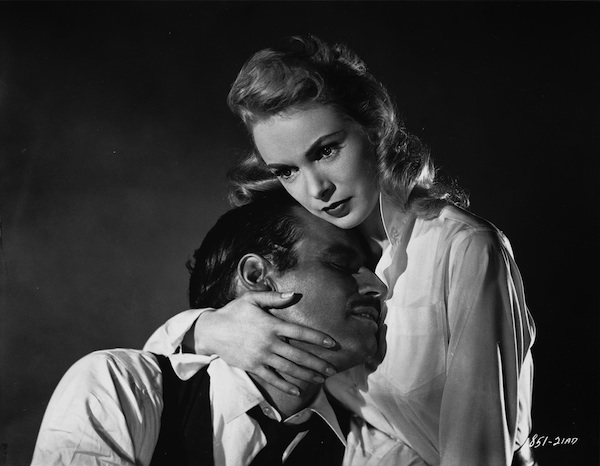
|
|
|
SEMINAR 10 | Tuesday, March 31, 2015
Spring Break--don't simulate, stimulate! Have a great week off! Whether this is in your future...

or this (more typical for graduate students)...

|
|
SEMINAR 11 | Tuesday, April 7, 2015
 We are back from the break, well-rested and ready to rock! We enter our lovely, high-tech, low-ceilinged cell
seminar room having read Ira Levin's novella, THE STEPFORD
WIVES. Levin's meditation on delusion-fueled, male fantasy-driven
manufacture
gets us set for the home stretch of our tour of simulated/ing
Americans--though published in 1972 (and insprired by Levin's
experiences in Wilton, CT, during the 60s) is evocatively contemporary!
No spoiler alert, but do pay close attention to the professions of the
men's community association members. As you read, be sure to
find, highlight, print out
and comment upon what you view to be the most provocative passage in
the novel--
We are back from the break, well-rested and ready to rock! We enter our lovely, high-tech, low-ceilinged cell
seminar room having read Ira Levin's novella, THE STEPFORD
WIVES. Levin's meditation on delusion-fueled, male fantasy-driven
manufacture
gets us set for the home stretch of our tour of simulated/ing
Americans--though published in 1972 (and insprired by Levin's
experiences in Wilton, CT, during the 60s) is evocatively contemporary!
No spoiler alert, but do pay close attention to the professions of the
men's community association members. As you read, be sure to
find, highlight, print out
and comment upon what you view to be the most provocative passage in
the novel--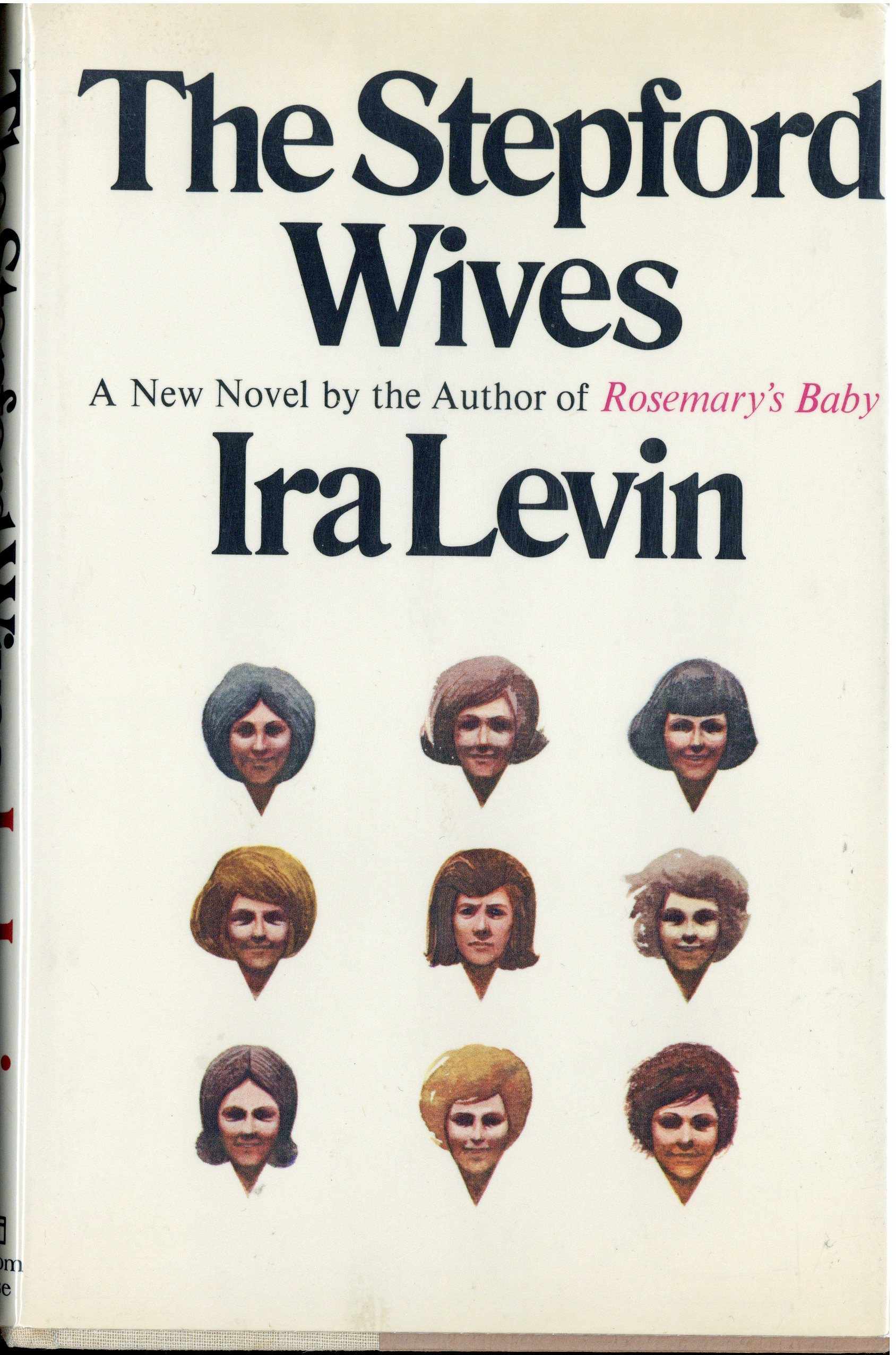 go ahead and author this piece as a mini-writing assignment
to turn in at the end of class (please don't let this piece of writing go longer than 2 to 3 pages, I just want a taste of your prose). This way, I can mark and return
your work to you before the big paper and you can have a sense of how I
grade--with each prof in the Department having their own peculiar set
of editorial proclivities, you will be less in the dark about my own
semantic/rhetorical eccentricities. go ahead and author this piece as a mini-writing assignment
to turn in at the end of class (please don't let this piece of writing go longer than 2 to 3 pages, I just want a taste of your prose). This way, I can mark and return
your work to you before the big paper and you can have a sense of how I
grade--with each prof in the Department having their own peculiar set
of editorial proclivities, you will be less in the dark about my own
semantic/rhetorical eccentricities.
|
|
SEMINAR 12 | Tuesday, April 14, 2015
I know, I know--we voted! And this is ... 'Merica... but graduate
seminars are a tyranny at times and this one will be no
different! So, for class next week, I would ask you to carefully
prepare both
The Bluest Eye by Toni Morrison...
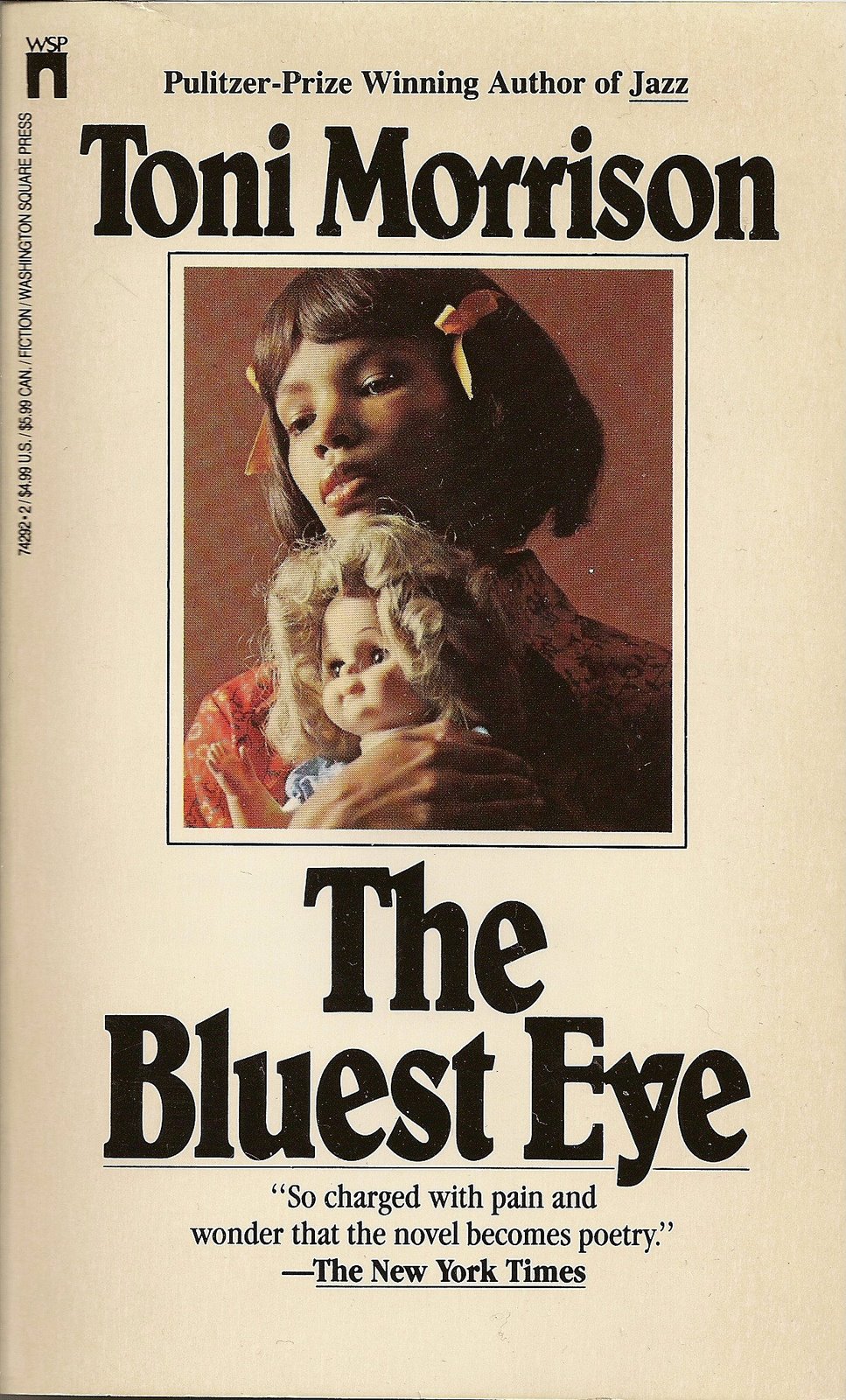
and the first half of:
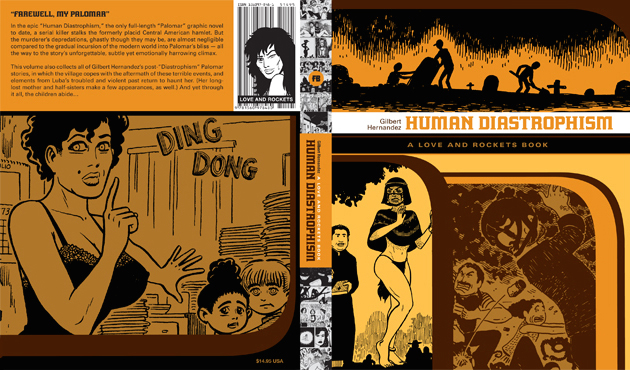
HUMAN DIASTROPHISM by Gilbert Hernandez
... the Frida Kahlo/Gilbert Hernandez chapter from Tex[t]-Mex is optional!
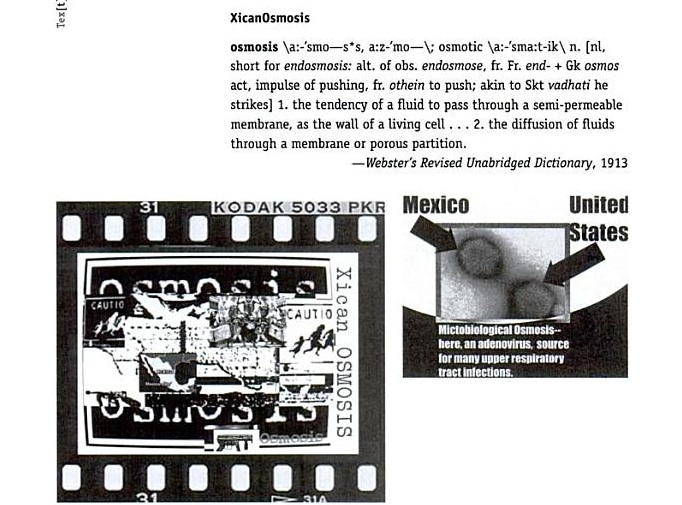
|
|
SEMINAR 14 | Tuesday, April 21, 2015
With Invisible Monsters, Chuck
Palahniuk delves into our America now--one generation after the raucous
narrative cacophany of Pynchon, decades past the bilous black satire of
Vonnegut, years after the cynical seering wisdom of DeLillo,
Palahniuk's nauseous, nauseating meditation on our particular strain of
Uncle Sam's narcissism is enough to make us look away, make us stop
reading--but we won't, of course. Like a train wreck, like a Kardashian
meltdown, we cannot look away, cannot tear ourselves away from a
spectacle that is as mesmerizing as it is terrifying, our ubiquitous
asylum of invisible monsters.
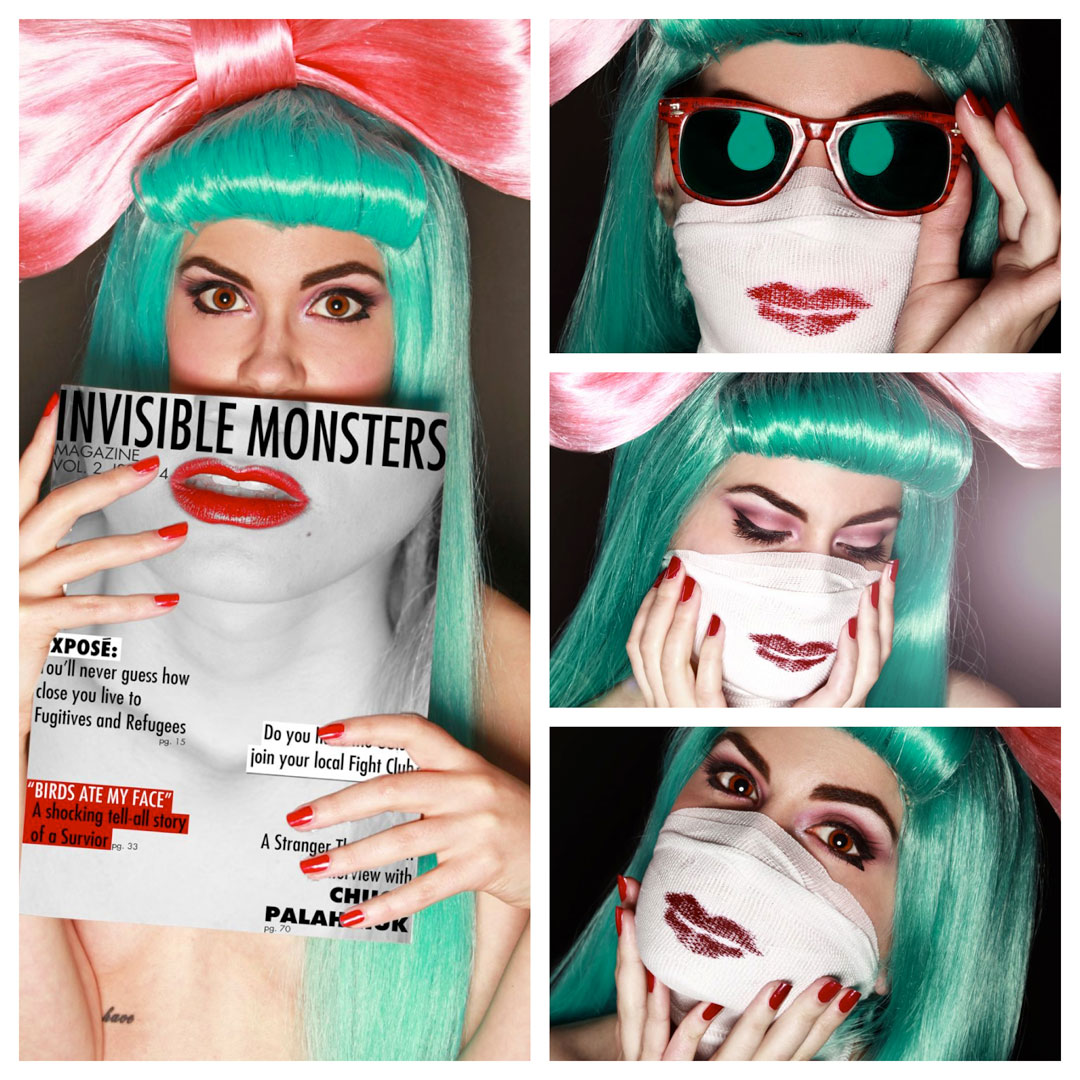
|
|
SEMINAR 15 | Tuesday, April 28, 2015
Our
colleague Julie Kitterman opens the class with a performance
piece. Next up? LARS AND THE REAL GIRL falls into our laps
and opens our eyes with Nancy
Oliver and Craig Gillespies moving allegory of love, loss, and
more. We watch, mouth agape, as Bianca moves into Lars's life and
ends up overwriting an entire community. At some level, we know that
"Bianca," Lars's beloved is a prosthesis, a proxy, a placebo--but she
is more as well. As the film unfolds we come to relearn (for the
first time?) the depths of the American simulacra--we simulate as we
are simulated, ape even as we mirror, and in the process come to a
better understanding of what it means to be in the 21st century.
A doll, our tutor to ontology? Something like that, and more!

|
|
SEMINAR 15 | Tuesday, May 5, 2015
No class. No party! You get an extra week to write a killer essay!

|
|
SEMINAR 16 | Tuesday, May 12, 2015 LAST SEMINAR (OPTIONAL)

Class colloquium/party--as this class is after the regular class
period, your participation in this gathering is optional, but I hope
you come anyway. Class will be held in the side room of the BLIND
LADY ALE HOUSE/Restaurant in the heart of Normal Heights, a few miles
from campus. Come as early as 3pm, if you wish; by 3:30 we will
go around the room as you share a 250 word/1page version of the essay
you are turning in as the culmination of your work this semester!
The first few drinks and food will be on the MALAS program, so don't
miss out on the wisdom, camaraderie, and fun!
http://blindlady.blogspot.com
3416 Adams Ave, San Diego, CA 92116 | (619) 255-2491

|
|
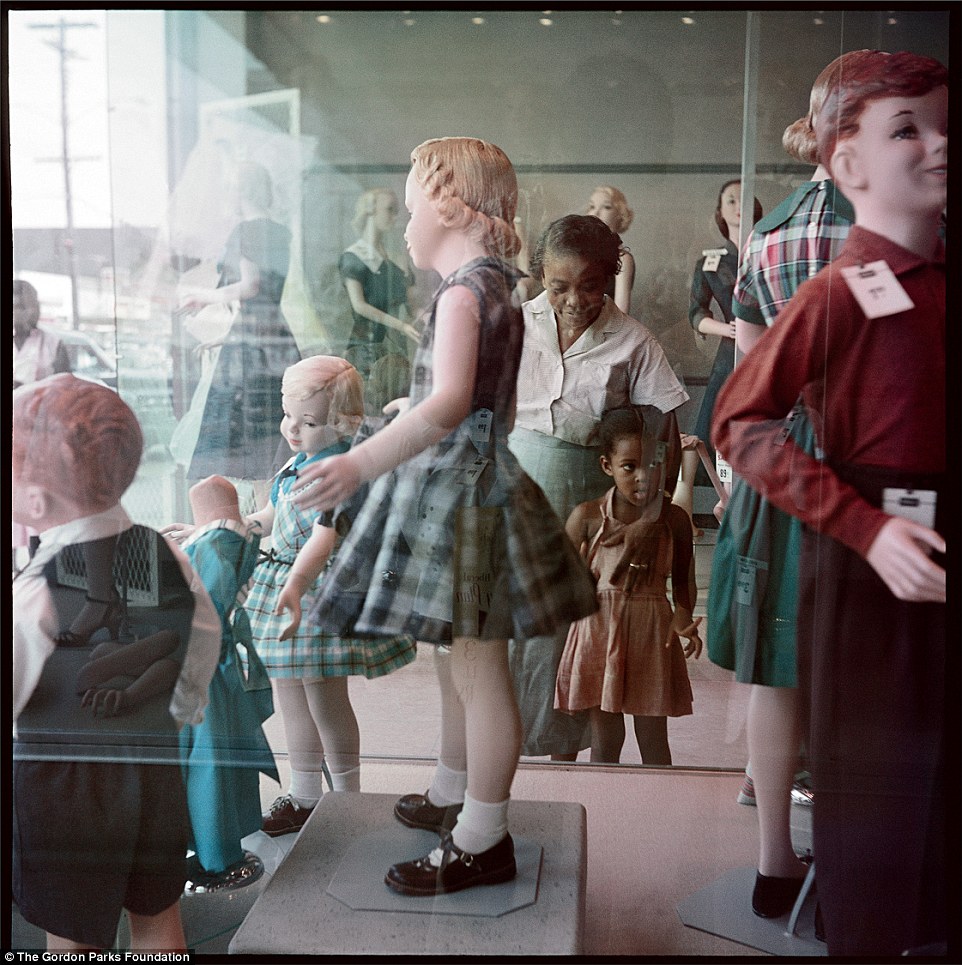  |
|